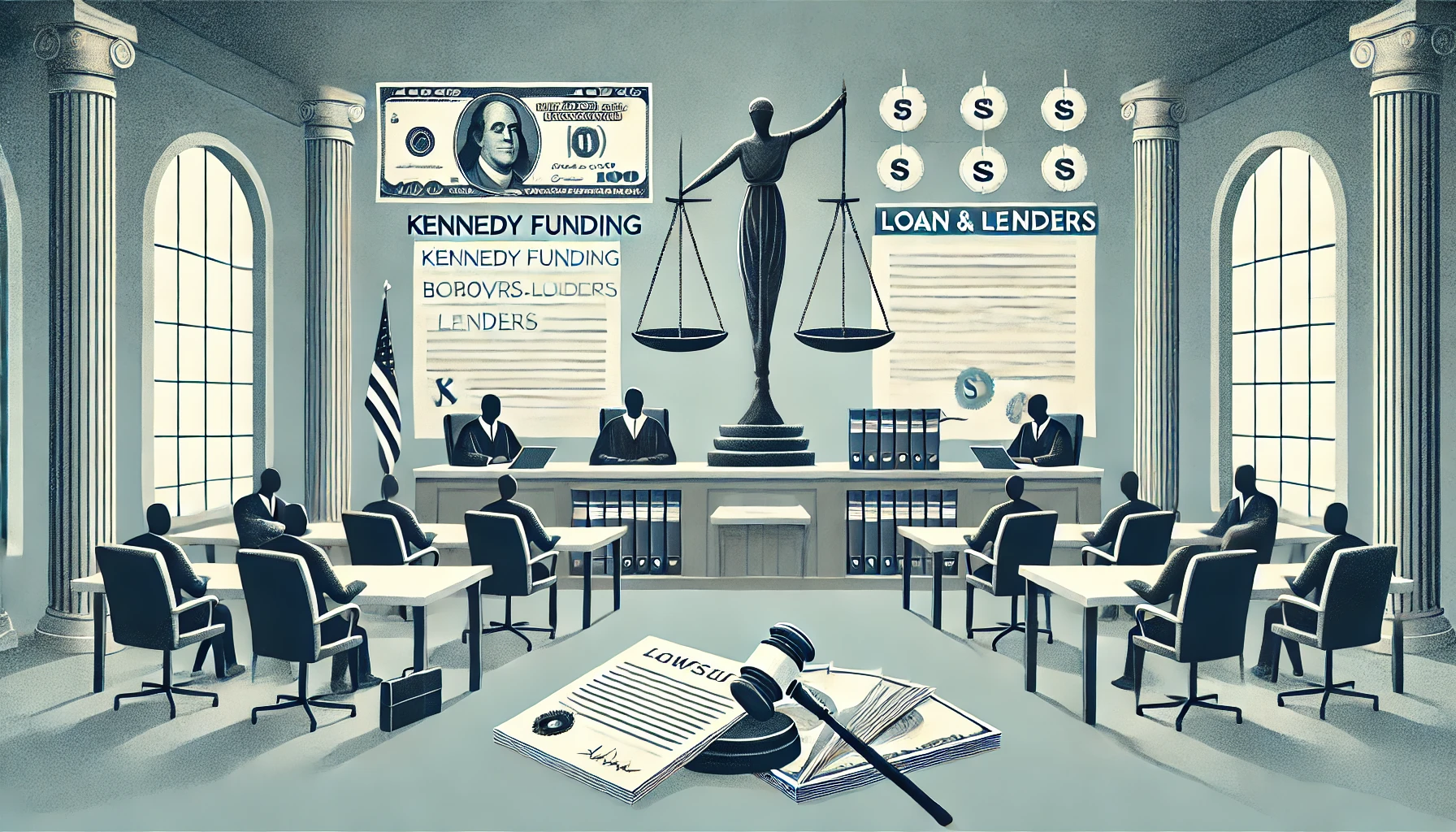
The Kennedy Funding lawsuit has raised significant questions about lending practices, transparency, and borrower protections. Known for their bridge loans in the commercial real estate sector, Kennedy Funding has come under scrutiny due to allegations of unfair lending practices. This article explores the background of Kennedy Funding, the timeline of the lawsuit, the impact on the lending industry, and valuable advice for borrowers navigating loan agreements.
Background of Kennedy Funding’s Business Practices
Founded in the 1980s, Kennedy Funding has built a name as a direct private lender specializing in bridge loans—short-term financing to “bridge” the gap for businesses in need of quick capital. With loans ranging from $1 million to $100 million, Kennedy Funding has become a go-to option for companies across the U.S. and globally.
Their appeal lies in providing fast access to funds with fewer bureaucratic hurdles than traditional banks. However, some borrowers allege that Kennedy Funding’s streamlined approach lacks transparency. The Kennedy Funding lawsuit exemplifies the risks of rapid lending without clear, upfront disclosure of all loan terms, fees, and conditions.
Timeline of Events in the Kennedy Funding Lawsuit
Understanding the timeline helps illuminate the challenges and legal intricacies of the Kennedy Funding lawsuit. Here is a chronological breakdown:
- Initial Borrower Complaints: Multiple borrowers claimed they encountered unexpected fees and altered loan terms, feeling trapped by what they described as unfair lending practices.
- Lawsuit Filing: Several plaintiffs officially filed suits, alleging Kennedy Funding had breached contract terms and engaged in predatory practices.
- Court Rulings and Appeals: The lawsuit saw numerous legal milestones, with rulings that initially favored the plaintiffs. Kennedy Funding’s appeal efforts were largely unsuccessful, leading to reinforced rulings supporting borrower claims.
- Current Status: As the case progresses, its outcomes may set a legal precedent for other private lenders, potentially prompting regulatory reform and increased industry scrutiny.
Key Issues in the Kennedy Funding Lawsuit
The Kennedy Funding lawsuit hinges on several primary complaints, each impacting borrowers significantly:
- Misleading Loan Terms: Borrowers allege that the terms of their loans were not fully transparent or were unexpectedly altered. For example, interest rates or loan repayment conditions were sometimes changed last-minute, which added unforeseen costs.
- Excessive Fees: Plaintiffs have highlighted fees they consider exorbitant, arguing these charges were either poorly disclosed or added unexpectedly, putting undue financial strain on borrowers.
- Predatory Lending Allegations: Accusations suggest that Kennedy Funding may have targeted financially vulnerable borrowers with high-risk loan terms that were difficult to meet.
- Breach of Contract: Multiple plaintiffs have claimed that Kennedy Funding did not honor their agreements, alleging that contract violations led to financial harm.
These core issues have positioned the Kennedy Funding lawsuit as a significant case with implications for private lending, raising questions about lender accountability and borrower protections.
Potential Impact on the Commercial Real Estate Market
The Kennedy Funding lawsuit could have a ripple effect on the commercial real estate lending market. If the lawsuit results in increased regulation for private lenders, this may prompt a shift towards more transparent lending practices. For example, bridge loans may require stricter documentation and disclosure standards, leading borrowers to feel more secure in their agreements.
On the flip side, a ruling in Kennedy Funding’s favor might embolden similar practices in the industry, potentially creating a more challenging landscape for borrowers. For the commercial real estate sector, this case highlights the importance of clear, ethical loan structures that safeguard borrower interests.
Legal Perspectives on Similar Cases
The Kennedy Funding lawsuit aligns with other high-profile cases in the private lending sector. Comparing it to similar lawsuits underscores the widespread need for greater transparency in bridge loans and other high-stakes lending agreements.
Cases involving allegations of predatory lending practices often revolve around unclear terms, hidden fees, and rushed agreements. These similarities reinforce the importance of holding lenders accountable and ensuring legal frameworks protect borrowers from exploitative practices. The outcomes of such cases frequently result in regulatory reforms and set a precedent for the financial industry.
What Borrowers Should Look for in Loan Agreements
The Kennedy Funding lawsuit serves as a reminder for borrowers to exercise caution and thoroughness when entering loan agreements. Here are key areas to consider:
- Detailed Review of Terms: Understand every term, especially interest rates, fees, and repayment schedules.
- Hidden Fees: Scrutinize any ambiguous fees or unexplained charges, and ask for clarifications in writing.
- Loan Agreement Language: Ensure that the language in the contract is clear and precise; if necessary, have a legal advisor review it.
- Questions and Red Flags: Don’t hesitate to question vague terms or high fees, and walk away if something doesn’t seem right.
Engaging legal or financial counsel is highly recommended to avoid unexpected complications, a step that can save borrowers from costly mistakes.
Steps Kennedy Funding is Taking to Address the Lawsuit
While Kennedy Funding has not publicly disclosed any specific steps to resolve the lawsuit, cases like this often lead to companies revisiting their business practices. A shift towards more transparent loan processes, clear fee structures, and comprehensive borrower communication could help regain public trust.
Some lenders, after facing lawsuits, opt to create advisory teams to improve customer service, streamline documentation, and emphasize transparency in future agreements. It remains to be seen whether Kennedy Funding will take similar steps in response to this legal scrutiny.
Broader Implications for the Financial Industry
The Kennedy Funding lawsuit could inspire changes in the financial sector by reinforcing the need for responsible lending practices. Specifically, private lenders might face increased regulatory oversight, including:
- Enhanced Fee Disclosures: Lenders may be required to provide explicit, upfront information about all potential fees.
- Mandatory Loan Term Transparency: Loan agreements might need to include a standard section outlining the full cost, preventing last-minute changes.
- Improved Borrower Protection Laws: These could ensure borrowers have a clearer understanding of the risks before signing.
Such regulatory changes would benefit borrowers by fostering an environment where lending practices are both fair and transparent, promoting financial integrity across the industry.
Lessons for Borrowers and Lenders
Both borrowers and lenders can take away valuable lessons from the Kennedy Funding lawsuit:
- For Borrowers: Due diligence is critical. Always review loan agreements thoroughly, consult legal counsel, and verify every term. Avoid rushing into agreements, as high-stakes decisions warrant careful consideration.
- For Lenders: The case highlights the importance of ethical practices. Transparency, honesty, and fairness in lending not only protect borrowers but also strengthen a lender’s reputation. Ethical practices also help prevent legal issues that can arise from opaque agreements.
The Role of Legal Counsel in Financial Disputes
Legal counsel can play an invaluable role in both preventing and resolving financial disputes. Competent legal advisors help:
- Ensure Compliance: They guide both lenders and borrowers to adhere to legal standards, minimizing the risk of future litigation.
- Navigate Complex Agreements: Lawyers can interpret complex legal terms for borrowers, ensuring they understand every clause before committing.
- Protect Interests: Legal advisors are trained to recognize potential pitfalls, helping borrowers avoid problematic loan terms.
Given the high stakes in commercial real estate lending, the presence of legal counsel can make a critical difference in safeguarding financial interests.
Implementing Robust Internal Policies
For private lenders, the Kennedy Funding lawsuit serves as a call to action. Building a foundation of compliance and transparency within financial institutions is essential for avoiding similar disputes. Here are a few ways lenders can protect themselves:
- Regular Audits: Internal audits ensure practices are fair, transparent, and in line with regulatory standards.
- Staff Training on Ethical Practices: Employees should be trained to communicate loan terms clearly and uphold ethical standards.
- Transparent Reporting: Transparency in financial reporting and customer communications fosters trust and helps prevent misunderstandings.
These measures not only improve compliance but also enhance a lender’s reputation and credibility.
The Future Landscape: Anticipating Changes
The Kennedy Funding lawsuit has the potential to prompt lasting changes in the commercial lending landscape. If the case results in new regulations, private lenders may need to adopt stricter practices that prioritize borrower protection, making transparency and ethical standards a cornerstone of their operations.
Looking ahead, borrowers may find increased protections in loan agreements, while lenders will likely need to navigate a more regulated environment. These changes could foster a fairer, more balanced lending sector, ultimately benefiting all parties involved.
Conclusion: A Call to Action for Financial Integrity
The Kennedy Funding lawsuit underscores the importance of financial integrity, transparency, and ethical practices in commercial lending. Borrowers and lenders alike must prioritize due diligence and legal compliance to ensure fair transactions. By learning from this case, the financial industry can move toward a future where trust and transparency define the lending process.
As this lawsuit unfolds, its implications will shape the practices of private lenders and safeguard borrower rights, promoting a more accountable and resilient financial marketplace for all.




